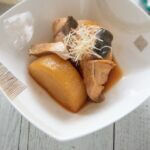
Simmered Kingfish with Daikon is considered to be a winter dish because winter is the best time for both kingfish and daikon. But you can of course make it all year round. Cooked in soy-based broth, the amber-coloured daikon and kingfish are so juicy and tasty. See the video.
Don't forget to see the section 'MEAL IDEAS' below the recipe card! It gives you a list of dishes that I have already posted and this recipe that can make up a complete meal. I hope it is of help to you.
- 500g/1.1lb daikon peeled
- 2 tbsp rice or white liquid from washing rice
- 350g/0.8lb kingfish fillet (note 1)
- ⅔ tsp salt
- 300ml/10.1fl.oz water
- 120ml/4.1fl.oz cooking sake
- 30g/1.1oz sugar
- 50ml/1.7fl.oz mirin
- 40ml/1.4fl.oz soy sauce
- 10g/0.4oz ginger thinly sliced
-
Cut the daikon into 2-2.5cm/¾-1" thick discs. If the daikon discs are very large, halve them.
-
Using a peeler or a knife, trim every edge of the daikon pieces. This is called ‘mentori’ (面取り), which prevents the edges of the vegetable pieces from crumbling while being cooked.
-
Follow the instruction steps 3-6 of my recipe, Simmered Daikon (Daikon Fukumeni) to pre-cook daikon pieces.
-
Cut the kingfish fillet into large bite-size pieces.
-
Sprinkle salt all over the fish pieces and leave for 5 minutes (to remove fishy smell).
-
Bring water (not in the ingredient list) to a boil in a saucepan that is wide enough to fit a flat sieve or a slotted spoon in. Then, reduce the heat to gently boil.
-
Take one piece at a time, place the fillet on the sieve/spoon and lower it into the boiling water.
-
Shake a little bit and as soon as the colour of the fish piece changes to white with no raw patches, transfer the fish to the ice water. Do not overcook the fish.
-
Examine each fillet in the ice water and remove the scum if it is stuck on the fish. You can leave the fish in the ice water until required.
-
Put water and cooking sake in a shallow saucepan that can fit the daikon pieces in without overlapping.
-
Put the daikon pieces in the pan, place a drop lid on, and bring it to a boil. Cook for 15 minutes or so, until the water reduces to about 2/3 of the original depth.
-
Add sugar and mirin to the pot and continue to cook with the drop lid on until the liquid covers half the height of the daikon pieces.
-
Place fish fillets on top of the daikon, scatter the ginger, then pour soy sauce over.
-
Place the drop lid on and cook for 5 minutes with a lid on (note 2).
-
Remove the lids and continue to cook until the sauce reduces to a small amount (note 3).
-
Transfer daikon and kingfish pieces to a serving dish. Pour the remaining sauce over them.
-
Serve with harishōga on top if using.
1. I used hiramasa kingfish cutlet today. It was about 2cm/¾” thick. The ideal thickness of the fillet is 1.5-2cm/⅝-¾”. If your fillet is wide, slice it into thin pieces.
If you can buy a large and fatty kingfish fillet, that would be the best.
2. You may shake the pot so that the simmering sauce penetrates the fish pieces.
3. You may want to use a ladle to pour the sauce over the fish so that fish gets more flavour.
4. Buri Daikon keeps in the fridge for a few days. It actually taste better the next day since the flavour penetrates the daikon and fish pieces.
5. Nutrition per serving as a side.
serving: 351g calories: 257kcal fat: 4.8g (7%) saturated fat: 1.2g (6%) trans fat: 0.0g polyunsaturated fat: 1.3g monounsaturated fat: 1.8g cholesterol: 48mg (16%) sodium: 1046mg (44%) potassium: 718mg (21%) carbohydrates: 21g (7%) dietary fibre: 2.1g (8%) sugar: 16g protein: 22g vitamin a: 1.7% vitamin c: 50% calcium: 4.8% iron: 6.4%